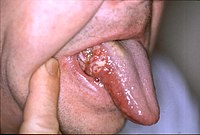
Photo from wikipedia
The contemporary literature is discordant regarding the role of delayed diagnosis in the prognosis of patients with oral cancer. This study examined data on a previously reported cohort of 101… Click to show full abstract
The contemporary literature is discordant regarding the role of delayed diagnosis in the prognosis of patients with oral cancer. This study examined data on a previously reported cohort of 101 patients with oral squamous cell carcinoma diagnosed at a single institution between 2008 and 2010. The time interval between symptom onset and initial histological diagnosis (diagnostic delay) was recorded for each patient, as were demographic data and cancer features such as T stage, nodal status, and smoking status. The mean follow-up period was 4 years 10 months. The mean diagnostic delay was 4 months, mean overall survival was 5years 6 months, and mean disease-specific survival was 4 years 9 months. No significant correlation was found between diagnostic delay and overall survival, disease-specific survival, or recurrence rates. Patients with node-positive disease were more likely to be diagnosed earlier, whereas women and non-smokers were more likely to have a delayed diagnosis. Inherent tumour biology is likely an important prognostic factor separate to diagnostic delay. Public education efforts should focus on symptom recognition and encourage early presentation for investigation of oral lesions, particularly for females and non-smokers, so that more aggressive tumours can be treated sooner to give the best chance at survival.
Journal Title: International journal of oral and maxillofacial surgery
Year Published: 2020
Link to full text (if available)
Share on Social Media: Sign Up to like & get
recommendations!